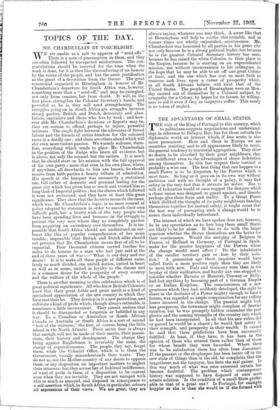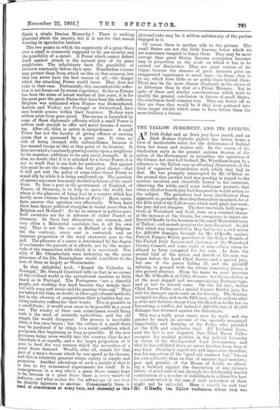THE ADVANTAGES OF SMALL STATES. T HE visit of the King
of Portugal to this country, which to politicians suggests negotiations and understand- ings in reference to Delagoa, Bay, has for those outside the diplomatic world an interest which, if less acute, is also more permanent. Here and there in Europe we see countries resisting, and to all appearances likely to resist, the general tendency to territorial aggregation. They show no desire to be absorbed by their great neighbours, they are indifferent even to the advantages of closer federation among themselves. In this last respect their instinct is probably a wise one. The best thing that can happen to a small Power is to be forgotten by the Powers which it most fears. So long as it goes on in its own way without ambition and with no thought of a policy, it may find safety in the very fact that it attracts no notice. But to talk of federation would at once suggest the dangers which a closer union was designed to guard against, and thereby perhaps give them form and reality. To a Great Power which dislikdd the thought of its petty neighbours banding themselves together for mutual safety, it might occur that the best way of preventing such a change would be to annex them individually beforehand.
The interest of which we have spoken does not, however, lie in any speculation as to how long these small States are likely to be let alone. It has to do with the larger question whether the States themselves are the better for their continuance. Would the merging of Belgium in France, of Holland in Germany, of Portugal in Spain, make for the greater happiness of the Poivers whom the change would most affect ? Do the inhabitants of the smaller territory gain or lose by their isola- tion ? A generation ago these inquiries would have called forth a more positive reply than they are likely to meet with now. Italy and Germany were then in the heyday of their unification, and hardly any one stopped to consider whether Bavaria or Hanover, Tuscany or Sicily, had lost anything by becoming part of a German Empire or an Italian Kingdom. The consciousness of a new greatness which they had suddenly developed, the right to share in the destinies of a Power mighty enough to have a future, was regarded as ample compensation for any trifling losses incurred in the change. The peasant might look less prosperous, the townsman might complain of heavier taxation, but he was promptly bidden remember the past glories and the coming triumphs of the country into which he had been incorporated. In all that his new rulers did or gained he would be a sharer ; he would find safety in their strength, and prosperity in their wealth. It cannot be said that these predictions have been universally fulfilled. At least, if they have, it has been in the opinion of those who uttered them rather than of those for whose benefit they were hazarded. Where there was to be satisfaction there has often been discontent. If the peasant or the shopkeeper has been better off in the new state of things than in the old, he complains that the taxgatherer, not the taxpayer, has been the real gainer. In this way much of what was once esteemed certain has become doubtful. The problem which contemporary history was supposed to have disposed of once more awaits solution. Is the condition of a small State prefer- able to that of a great one ? Is Portugal, for example. Spain a single Iberian Monarchy ? There is nothing practical about the inquiry, but it is not for that reason wanting in speculative interest.
The two points in which the superiority of a great State over a small is commonly' supposed to lie are security and the possibility of a career. A Power which cannot defend itself against attack is the natural prey of - its great neighbours. The inhabitants have the possibility of invasion constantly before their eyes. Numberless reasons may protect them from attack on this or that occasion, but they can never have the best reason of all,—the danger which the attacking Power would incur. That does not exist in their case. Fortunately, this uncomfortable reflec- tion is not borne out by recent experience. So far as Europe has been the scene of actual warfare of late years, it is for the most part the great States that have been the sufferers. Belgium was unharmed when France was dismembered. Austria and Turkey, not Portugal or Switzerland, have seen hostile armies within their frontiers. Modern wars seldom arise from pure greed. The excuse is furnished by some of those diplomatic affronts which a small Power is seldom rash enough to offer and never dreams of resent- ing. After all, there is safety in insignificance. A small Power has not the faculty of giving offence or causing alarm that is possessed by a great one. It runs no risk of being charged with unfriendliness because it has massed troops at this or that point of its frontier. It does not entail a constantly growing outlay upon a neighbour by its ceaseless additions to its own naval strength. It is true, no doubt, that if it is attacked by a Great Power, it is not to itself that it can look for protection. But against this must be set the chance—the very areat chance—that it will not suit the policy of some other Great Power to stand idly by while it is being swallowed up. The question of careers may seem less easily decided in favour of the small State. To bear a part in the government of England, of Prance, of Germany, is to help to move the world, but where is the pleasure of being first in a country which has hardly more citizens than London or Paris ? Here, again, facts answer this question very effectually. Where have there been fiercer political struggles in recent years than in Belgium and Holland ? So far as interest in politics goes, both countries are far in advance of either France or Germany. In these last abstentions are common, and very often a Ministerial candidate has it all his own way. That is not the case in Holland or in Belgium. On the contrary, every seat is contested, and an immense proportion of the total electorate goes to the poll. The pleasure of a career is determined by the degree of excitement the pursuit of it affords, not by the magni- tude of the transaction with which it is associated. Pos- sibly if Mr. Chamberlain were reckoning up .the great pleasures of his life, Birmingham would contribute to the sum of them as largely as Westminster.
In that delightful book, " Round the Calendar in Portugal," Mr. Oswald Crawfurd tells us that in no corner of the civilised world is the agricultural machine so little heard as in Portugal. The Portuguese " are a cheerful people, not working less hard because they mingle their toil with song and music and the passing wine-cup." They are behind the time, no doubt, in their agricultural methods, but in the absence of competition their primitive but un- tiring industry suffices for their wants. This is possible in a small State ; it would soon cease to be possible in a great one. The rivalry of their own countrymen would bring with it the need of scientific agriculture, and the old simple life would disappear. The process is inevitable when it has once begun ; but the citizen of a small State may be pardoned if he clings to a social condition which postpones that beginning as long as possible. If the new processes bring more wealth into the country, they do not distribute it so equally, and a far larger proportion of it goes to feed the vast revenue which the necessities of a great State demand. Wealth, after all, stands for that part of a man's income which he can spend as he chooses, and this is relatively greatest where society is simple and primitive. Another advantage of such a society is that it is free to try economical experiments for itself. It is homogeneous in a way which a great State cannot hope to be, because in a great State there is every variety of industry, and what makes for the advantage of one may be directly injurious to another. Consequently there is teed of compromise at every turn, and necessary as this give-and-take may be, it seldom satisfies any of the parties engaged in it.
Of course there is another side to the picture. The small States are not the little heavens below which we are sometimes tempted to fancy them. They may be more corrupt than great States, because corruption becomes easy in proportion as the scale on which it has to be carried out diminishes. They are great centres of in- trigue, because the absence of great interests gives an exaggerated importance to small ones,—to those, that is to say, which have little or no public force behind them. There may be far more finesse displayed in the choice of an Alderman than in that of a Prime Minister. Yet in spite of these and similar considerations which tend to qualify the general conclusion in favour of small States, the conclusion itself remains true. They are better off as they are than they would be if they were gathered into those larger wholes which seem to have before them far more brilliant a future.











































 Previous page
Previous page